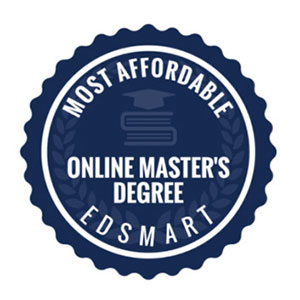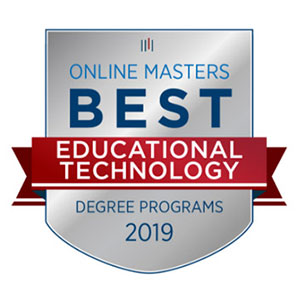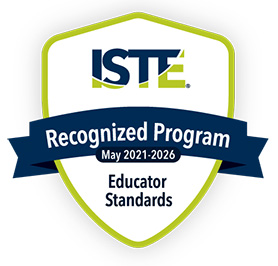|
Frequently Asked Questions
-
What is an Instructional Technology Masters (M.Ed.) degree, and what does it prepare
me to do?
|
The program is built on the Georgia Professional Standards Commission (GaPSC) Standards
for Instructional Technology and the International Society for Technology in Education
(ISTE) Standards for Educators (ISTE-E) . These standards will:
Help you use technology in your classroom to improve student learning
Help you help other educators use technology to improve student learning.
This degree is designed to create technology teacher leaders who stay in the classroom,
but use technology effectively and serve as a resource for their schools and grade-level
or content-area teams.
This degree can also lead to part-time or full-time education-related leadership positions
at the school/district level or in educational service agencies. Some of these positions
may be technology related, such as technology coaches or technology integration specialists.
With instructional technology expertise, some students become more marketable to assume
content-related leadership positions, such as math/science coordinators, ELL coordinators,
professional development specialists, etc.
Depending on the types of electives chosen (see discussion on electives, endorsements,
and certificates below), students can market themselves in many ways. They can complete
any number of endorsement programs such as, Teacher Leader, Reading, ESOL, or the
Online Teaching Endorsement.
|
-
Will I receive a pay increase with a Masters Degree in Instructional Technology?
| The Masters Degree in Instructional Technology satisfies requirements for an S-5 (Service)
certification and an upgrade from a T-4 to a T-5. Candidates must pass the GACE for
Instructional Technology to be eligible for the new S-5 certification and the upgrade.
While compensation should be reviewed with your school/district, under current regulations
educators are paid on their highest certificate level (4, 5, 6, or 7). If your salary
is based on your Georgia certificate level, you should receive a salary increase.
According to the GaPSC, you do not have to hold an Instructional Technology position
to receive the salary increase. Please check with your school/district on any policies
that may be contrary to this information. If you have questions regarding your individual
certification status, you should check with the PSC at https://www.gapsc.com or email them at mail@gapsc.com. |
-
No. You do not have to take the GRE for the Master's Degree in Instructional Technology. |
-
What certifications/endorsements/specializations does this degree yield?
|
Endorsement Options:
Online Teaching Endorsement (3 classes)
Personalized Learning Endorsement (3 classes)
Teacher Leadership Endorsement (3 classes)
Reading Endorsement (3 classes)
ESOL Endorsement (3 classes)
Gifted Endorsement (4 classes)
KSU Certificates:
Online Teaching Certificate (3 courses) This option is for educators who do not hold a clear, renewable teaching
certificate in Georgia, and are not eligible to receive the Online Teaching Endorsement.
Personalized Learning Certificate (3 courses). This option is for educators who do not hold a clear, renewable teaching certificate in Georgia, and are not eligible to receive the Personalized Learning Endorsement.
|
-
What else can I do with my electives?
You can also customize your own elective options. For example, some seek graduate
courses in Math, Science, Special Education or Information Technology. Those who are
able to come to on-campus classes will have more options with their electives. Not
all courses are offered online. Advisors can help students customize an option. ITEC
Departmental approval is required. |
-
What is the difference between an endorsement and a KSU certificate option?
An endorsement program is approved and recognized by the GaPSC. After completing coursework,
you can apply to have an endorsement added to your existing GaPSC certificate. The
GaPSC does not add KSU certificate programs to your Georgia teaching certificate,
but the KSU certificate programs package highly marketable coursework to enhance your
opportunities as educators. |
-
What is the cost for the program?
| Beginning Fall 2024, the fully online ITEC MED Certification program costs $2698 each semester. The e-tuition rate is $393 per credit hour + $340 online learning fee each semester. Students take two classes per semester or six credit hours. The program spans five semesters so the total cost for tuition and fees for the entire program is $13,490. Books and one-time graduation fee ($50) are additional costs. E-tuition and fees are the same for both in-state and out-of-state students. Please, keep in mind that tuition rates are subject to change without notice. To see the latest cost per credit hour, please select the “E-Tuition and Fees” link on https://fiscalservices.kennesaw.edu/bursar/tuition-fees/tuition-fees.php. After downloading the PDF, see "Graduate Online Student-E-Tuition Credit Hours." |
-
The M.Ed. in Instructional Technology is two years. There are more accelerated programs out there—for example, ones that finish in one year and/or utilize weekend meeting times. However, we are a two-year program by design. With teachers’ busy schedule in mind, our program is paced so that it does not overwhelm working teachers or monopolize their weekends. When we were designing the program, our potential students wanted to keep teaching full time and to attend key family events on the weekends—such as their children’s athletic activities. We are a work-friendly, family-friendly program. |
-
How can I finance this program?
|
Unfortunately, the legislature has discontinued Hope Scholarship for Teachers, but
there may be other financial aid options for you. KSU has a financial aid office to
assist you. Please, visit following website describing the financial aid options for
graduate students: https://graduate.kennesaw.edu/admissions/apply/online-application.php.
If you are seeking financial aid and have questions or need assistance, please contact https://financialaid.kennesaw.edu/contact-counselor.php
If you find you are not eligible for financial aid, remember there are tax credits
for continuing education, a salary increase following your graduation, and deferred
payment on some student loans while still in school.
If you are paying your own way, you will find Kennesaw’s public university tuition and fees are quite reasonable compared to private institutions. You also will find that paying over the course of a two-year program is more financially feasible than one-year, accelerated programs.
Paying for the rising costs of a college education is a concern for nearly every student and family. To help you meet your educational expenses, Kennesaw State University is pleased to offer Nelnet Business Solutions’ (NBS) convenient budget plan. This is not a loan program. There are no interest or finance charges, and there is no credit check. Enrollment in this plan is easy and available online. To enroll, please visit http://www.mycollegepaymentplan.com/kennesaw
|
-
What are some other reasons why I should consider KSU?
- Our faculty members and instructors are typically former K-12 teachers, who are still
active in partnerships with K-12 schools. Many have also held key leadership positions
at the school, district, state, and national levels. We are familiar with schools.
We use the tools you have in schools and help you understand district policies and
planning processes related to technology.
- Our faculty have excellent academic credentials and are actively pursuing research
in their fields of study.
- You will become part of a regional and national network of technology leaders.
- Our curriculum is practical—based on projects you will complete in your own schools.
- Our program will prepare you for advanced study, should you decide to pursue an Ed.S.,
Ed.D. or Ph.D. program in the future.
|
-
What are the application requirements for this program?
|
Applications do NOT require GRE scores require, but do require the following:
- Transcripts from each college attended
- Bachelor's degree in K-12 teacher education or related field - 2.75 GPA
- Clear Renewable Teaching Certificate or equivalent certificate and/or experience
- Professional Resume
- Mentor Form
|
-
Who can serve as my mentor?
|
The mentor operates as part of a learning team with the candidate and university faculty,
ensuring the candidate has an opportunity to complete his or her field experiences
and/or working with university faculty and candidates to identify appropriate alternative
experiences. The candidate selects a mentor at the building or district level with
instructional technology knowledge and experience and other qualifications listed
below:
- Teaching Certificate or Service Certificate
- Minimum of 1 year of teaching experience
- Knowledge or experience in instructional technology
- Previous experience with mentoring
- Master’s Degree or Technology Certifications
|
-
- Provide access to a wide range of instructional technology experiences required by the candidate’s degree program (such as participating on school data teams, serving on the school technology committee, and conducting a technology inventory).
- Facilitate, as necessary, the candidate’s access to school and/or district resources necessary to complete his or her field experiences.
- If the candidate is unable to complete field experiences assigned by university faculty
due to district or school constraints, working with the candidate and university faculty
to identify appropriate alternative experiences.
- Provide time for meaningful reflection on field experiences with the candidate.
- Provide, as necessary, feedback to the candidate and/or university faculty on the mentor’s perceptions of the candidate’s growth as a technology facilitator in the school.
- Complete university-required assessments of the candidate’s progress by completing the Candidate Performance Instrument (CPI) and Candidate Disposition Assessment (CDA) during the 3rd and 6th semesters.
|
-
When does the program enroll and when must I apply?
- The M.Ed. fully online program enrolls each semester, Spring, Summer, and Fall.
- Admission deadlines will be posted on the website.
- Typically, admission deadlines are in December 1 for Spring; April 1 for Summer; and
July 1 for Fall.
|
-
-
Do I have to be working in an Instructional Technology position?
No, you do not have to be working in an Instructional Technology position to receive
the S-certification and upgrade to your existing certificate. |
|




















